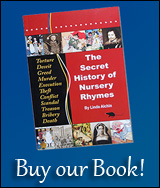I have just read the thread started by Archaic on the use of the phrase "I am down on..." to indicate strong disapproval (in the "Dear Boss" & elsewhere).
Following on from that, what does everyone think of the use of the word "buckled", in the same letter, suggesting, from the context "arrest" or capture"? Has anyone ever seen or heard of its use anywhere else in this way? (Personally I have no recollection of seeing this word used to indicate arrest, except in the DB or, as here, in references to it).
If it's not used elsewhere with that meaning, should we be taking a closer look at Buckle Street and its residents for the writer of the DB? There are only 12 Buckle Streets on the UK mainland, 1 in Sale, 1 in Peterborough, 9 in or near Evesham & only 1 within 85 miles of London - just south of Whitechapel High Street.
Following on from that, what does everyone think of the use of the word "buckled", in the same letter, suggesting, from the context "arrest" or capture"? Has anyone ever seen or heard of its use anywhere else in this way? (Personally I have no recollection of seeing this word used to indicate arrest, except in the DB or, as here, in references to it).
If it's not used elsewhere with that meaning, should we be taking a closer look at Buckle Street and its residents for the writer of the DB? There are only 12 Buckle Streets on the UK mainland, 1 in Sale, 1 in Peterborough, 9 in or near Evesham & only 1 within 85 miles of London - just south of Whitechapel High Street.






Comment